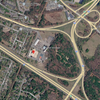GCSD to hold public hearing on tax breaks for first responders
— Still frame from May 23, 2023 Guilderland School Board meeting
Maintaining a robust volunteer fire service is crucial to public safety, and transitioning to a fully-paid service “would be astronomical and would undoubtedly result in skyrocketing taxes for all of our residents,” Mike Dempsey, a volunteer with the Guilderland Fire Department, told the school board on May 23.
GUILDERLAND — The school board here has come around to entertaining a tax break for first responders.
At its May 23 meeting, the board heard from Mike Dempsy, a volunteer with the Guilderland Fire Department, speaking on behalf of the Town of Guilderland Fire Chiefs and Commissioners Association.
He said a tax break “not only affects our local heroes but also embodies the spirit of gratitude and support for those who selflessly protect our lives and properties.”
Last year, Governor Kathy Hochul signed into law a bill, meant to help with recruitment and retention, that allows local taxing jurisdictions to offer a property tax exemption up to 10 percent for volunteer firefighters and volunteer ambulance workers whose primary residence is located in that jurisdiction.
While many local municipalities — including Albany County and the towns of Guilderland, Knox, New Scotland, and Westerlo — have already agreed to a tax break, the impact would be largest for schools since their taxes are highest. Locally, the Berne-Knox-Westerlo school district has agreed to a break.
Dempsey went over a long list of training and workshops that volunteers take on. “They spend countless hours away from their families, their jobs, and their personal lives to undergo the training and to attend the emergencies,” he said.
He also said that maintaining a robust volunteer fire service is crucial to public safety and that transitioning to a fully-paid service “would be astronomical and would undoubtedly result in skyrocketing taxes for all of our residents.”
Guilderland moved largely to a paid ambulance service in 2018 as it replaced the not-for-profit Western Turnpike Rescue Squad, which had been staffed mostly by volunteers.
In January, Guilderland School Board member Judy Slack told the board that the business practices committee recommended waiting rather than moving ahead with a tax break for first responders.
“It’s a very hard decision as I think it is for everyone because we respect these people,” Slack said then. “We honor their work because we wouldn’t be the type of community we are without them but, because our budget situation is very uncertain, it felt to all of us reluctantly that we would like to wait this time before we grant this exemption on their taxes.”
In February, The Enterprise editorialized in favor of tax breaks, calling for calculations on the cost.
On May 23, Assistant Superintendent for Business Andrew Van Alstyne provided cost calculations. He said that a number of volunteers in the gallery had attended a business committee meeting, providing “very useful feedback.”
Van Alstyne went over the state law, stressing that one of the criteria for a break is a minimum service requirement of two to five years and that, if a volunteer has 20 years of service, the tax break becomes permanent; also, a surviving unmarried spouse of a recipient killed in the line of duty can receive the benefit as long as the property remains their primary residence.
Since the application deadline is March 1, the earliest the tax break could go into effect for the Guilderland district would be for the 2024-25 school year, Van Alstyne noted.
With a “very large caveat” that his calculations were projections since actual numbers are not known, Van Alstyne said about 150 firefighters might be eligible for the exemption and the total assessed value for those firefighters would be about $41.5 million, which would come out to about $75,000 in tax breaks or roughly $490 per eligible recipient.
Since the tax levy would remain the same, that $75,000 would have to be made up by other taxpayers in the district. This would come to two cents per $1,000 of property value, Van Alstyne estimated.
So, if someone has a house assessed at $230,000, the annual impact to their taxes would be an additional, roughly $4.60.
A public hearing is required before the board can vote on whether or not to adopt the tax break.
Two board members — Rebecca Butterfield and Blanca Gonzalez-Parker — immediately spoke in favor of moving ahead with a hearing and Vice President Kelly Person, who ran the meeting in the absence of the president, Seema Rivera, said she appreciated the firefighters coming out.
Slack said that the effect on other taxpayers “is a concern.”
She went on, “Because our budgets are always a concern, we want to be fair to everybody … And, no matter how appreciative we are, there are people who aren’t as appreciative of that.”
“We can’t get into people’s heads,” responded board member Gloria Towle-Hilt, “so let’s have a public hearing. Let’s hear it … Let’s move onto the next step.”
Person said a hearing would be scheduled “fairly soon.”
Superintendent Marie Wiles noted that “people scatter” in the summertime and recommended scheduling the hearing for the board’s next meeting, June 13.



